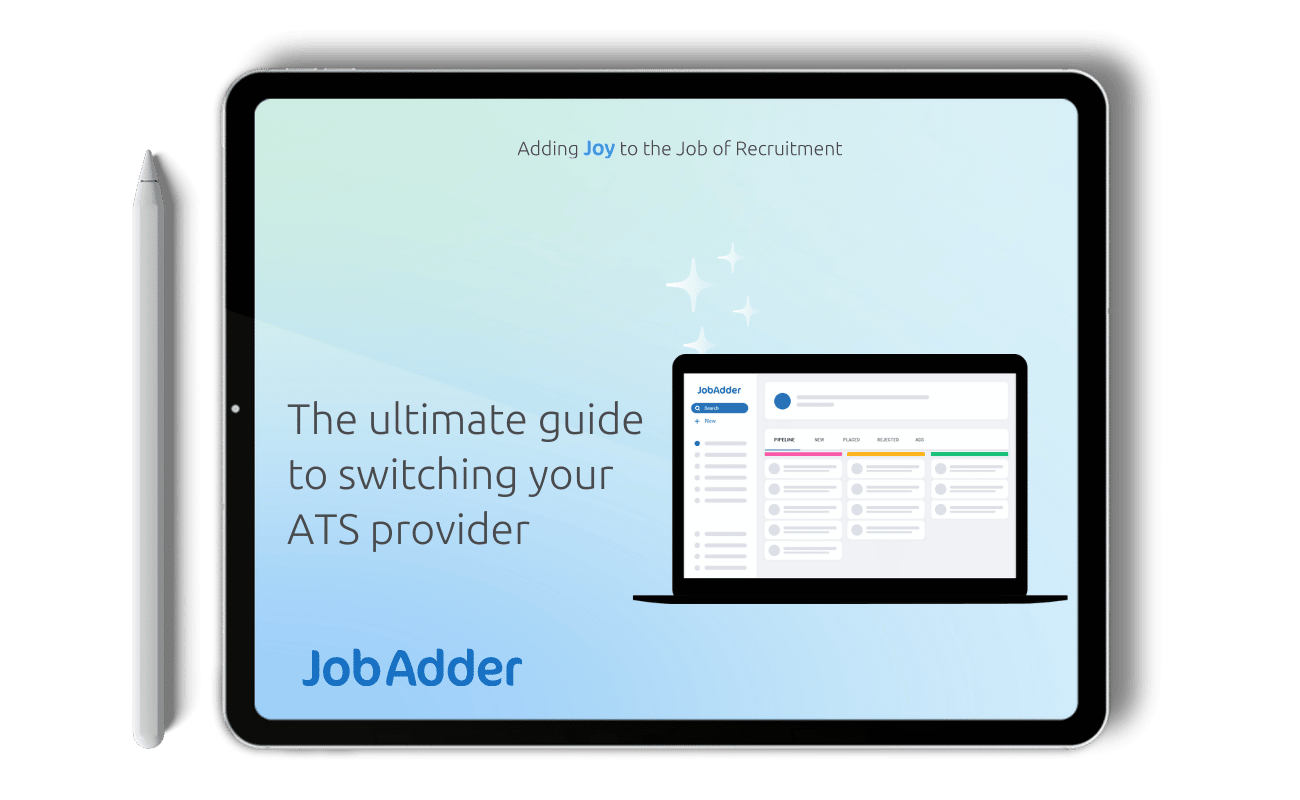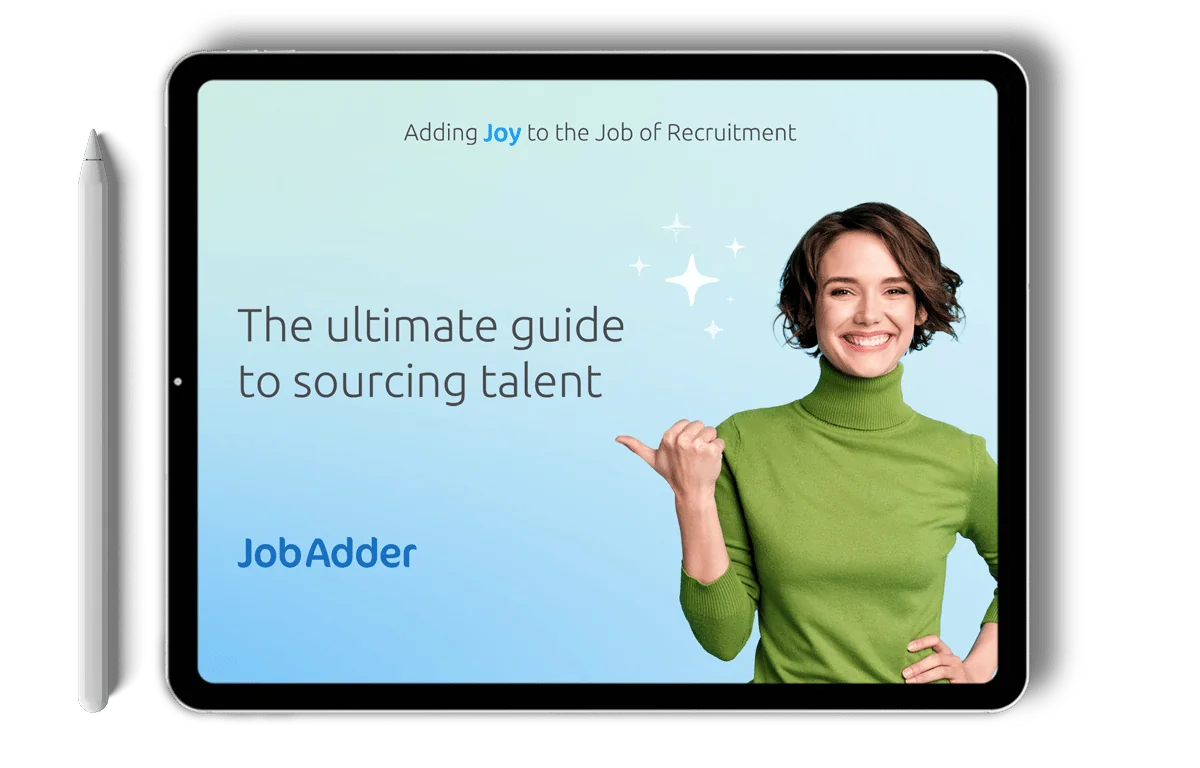Recruitment Blog
6 solutions recruiters can implement to fix a long hiring process

We all know that the hiring and recruitment process is something that takes time to perfect for each company.
While everyone’s goal is the same—finding the best candidates to fill your open positions—an overly complex and long hiring process can hamper this goal.
Many companies and hiring managers don’t realise how long their hiring process is, which can deter people from applying and moving through the hiring process.
Still, great hiring systems aren’t built overnight. Luckily, there are a few simple ways to transform your recruitment process into one that helps you get suitable candidates in the door.
FREE EBOOK: The ultimate guide to switching your ATS provider
What causes slowdowns in the hiring process?
It’s essential to identify what slows down your hiring process before you can streamline it. Here are the top mistakes companies make in their talent acquisition.
Lack of communication
Communication is a critical element of an efficient and streamlined hiring process. Poor communication at any stage of the recruitment process can lead to repetitive interviews, wasting time on unsuitable candidates or other avoidable slowdowns.
Be sure to communicate exactly what you’re looking for in job candidates for open positions. This communication starts with you and your talent acquisition team. Vague expectations from the top of the company can confuse job postings, resulting in interviews with unlikely candidates that waste everyone’s time.
Once your hiring team knows what you’re looking for in the top candidates, they need to establish strong communication with potential hires, starting with the perfect job description and consistent contact with the best candidates for the job.
Unclear job descriptions
A clear and concise job description is the only way to ensure that the best available candidates respond to the posting. Strong candidates will have their pick of various positions and won’t reply to unclear or confusing postings.
Less than ideal candidates are more likely to get in the door if your job description is unclear or inaccurate. How will they know if they meet your requirements if they can’t figure out what the requirements are?
An excellent job description details the qualifications required, job responsibilities and what the interview and hiring process will look like at your company. Your posting should give every candidate a clear picture of what will happen, from submitting their application to the day they’re hired.
Adjust your job descriptions each time you hire for a position, even if you recently filled the same one. Roles will change over time, and every job description should detail exactly what you need from the position now, not what you needed from it two years ago.
Not using the right technology
There are many resources available to streamline the hiring process at your company, so make the most of the tools and technology at your disposal.
Recruitment software has skyrocketed in popularity in recent years. Recruitment software is a broad term that often encompasses Candidate Relationship Management (CRM), Applicant Tracking System (ATS) and other related tools and integrations. Recruitment software helps you find the best talent, organise your hiring process and eventually hire the best person for the job.
In addition to this software, you can also use social media and job search sites to make your hiring process more efficient. Many job seekers rely on platforms like LinkedIn or Indeed to find their next position so it’s crucial that you’re utilising these platforms.
Now that you know what’s clogging up your hiring process, you can work on improving it.
Top 6 ways to make your hiring process more efficient
The best way to keep the right candidate interested in your company’s open positions is to streamline your hiring process, making it a quicker and more efficient candidate experience.
While you don’t want to rush into hiring someone who may not be the best fit for your company, a quick follow-up should be an integral part of your interview process. Always try to make your hiring decisions as soon as possible after finishing an interview.
Here are a few simple ways to make your hiring process more efficient without sacrificing the quality of the process:
- Promote your employer brand and company culture
- Automate parts of the hiring process
- Make the interview process collaborative
- Improve the candidate experience
- Strategically choose your interview questions
- Follow up with your candidates post-interview
These strategies will make your recruitment process manageable for your potential new candidates while also saving your company time and resources to use on other things.
1. Promote your employer brand and company culture
While it might not seem important, promoting your company culture will improve your recruitment process. Incorporating your company culture into the process will help each job candidate understand what it will be like to work with you before extending a job offer.
Your company culture refers to how your company runs and how people work within it. This broad term covers everything from the everyday behaviour of your employees to how they interact and socialise. Your company culture can impact the way employees feel at work, performance metrics and retention rates.
Before communicating your company culture to your candidates, you must understand it yourself. Forbes recommends learning more about your company culture by paying attention to how your employees act and interact with one another.
New hires who understand your company culture are less likely to drop out in the middle of the application process – or even worse, after being hired. Familiarity with the existing culture will increase employee retention by making it more likely that your employees are happy in their new roles.
Some new employees might make it through their final interview and into the position without fully understanding the company culture. However, these people are more likely to decide they no longer want to work with you. The more time you spend replacing talent, the less you have for growing and running your company.
2. Automate parts of the hiring process
Use technology to automate parts of a long hiring process. Recruitment software is available to source candidates, screen resumes, perform background checks and even send out rejection emails to unqualified candidates.
Hiring teams spend countless hours reviewing the finer details of resumes and even performing their own background checks. Automating these typically manual processes can save you significant time and energy by weeding out unsuitable candidates.
Without these time-consuming tasks, your hiring team can spend more time focusing on recruiting top talent and ensuring your application process gets the best candidates in the door. Your team will also have more time to improve your overall interview process.
3. Make the interview process collaborative
Collaborating on interviews is another way to streamline your interview process. Schedule interviews with multiple people in your company simultaneously instead of setting up individual meetings for candidates to meet various stakeholders.
Candidates usually meet at least two people throughout the average interview process, which is a best practice that assures candidates are assessed thoroughly while also making personal connections with people in your company.
The Harvard Business Review recommends having each candidate interview with at least three people at your company. These people should be their direct supervisor, someone above their immediate supervisor and an influential person from the hiring or recruitment team.
Collaborating in interviews means your candidates can still meet multiple people at your company without requiring numerous rounds of interviews. If possible, find the time for the candidate to meet with at least two of the people you hope to include in each interview.
Collaborative interviews will also reduce the time your employees must spend discussing potential candidates. Instead of one person describing the interview and candidate to the others, they can all sit in on the meeting and develop their opinions firsthand.
Meeting numerous people at your company is essential for finding the right candidate for your open position, but it doesn’t need to slow down your hiring process.
4. Improve the candidate experience
It’s just as crucial for you to impress your interviewees as it is for them to impress you.
One way to attract top talent is to ensure you’re delivering an excellent candidate experience. Requiring candidates to jump through hoops and endure a lengthy application process is a significant turn-off for the best and the brightest candidates.
The optimal candidates for your open positions will find you if your hiring process is streamlined and well-communicated. Your hiring team won’t need to do nearly as much headhunting or spend as much time in the interview process with potential new hires if the candidate experience is enjoyable and efficient.
5. Strategically choose your interview questions
Choosing strategic interview questions will reduce the number of interviews necessary to determine the best candidates. Intelligent questions can also reduce the amount of time you spend speaking with each candidate during each meeting.
Choose interview questions that tell you precisely what you need to know about your candidates. Keep them directly related to the position, the candidate’s capabilities and anything else you find essential to your company.
Plan strategic interview questions by reflecting on what your company needs and wants from whoever will fill the role you’re interviewing for, while also considering what type of person will fit best on the team.
Consider the types of people your new hire will be working with and what personality traits will fit well with the others. Are you looking for someone outgoing and friendly? Is it essential that they be well-organised and work well in routines? Will they need to excel under pressure? Asking yourself these and related questions can help you plan for a strategic interview.
Repeating questions in the interview process is tedious for you and your potential new hires. Once you know your interview questions, communicate them to others involved in recruiting new hires, which will help avoid multiple people from your company asking a candidate the same questions.
6. Follow up with your candidates post-interview
Follow up with your candidates after an interview to establish a timeline for the next steps. Reaching out with a projected timeline will let your candidates know what to expect and hold you accountable for sticking to your schedule.
Once you develop a timeline for making hiring decisions, sticking to it will help prevent you from accidentally extending your long hiring process. Setting deadlines for yourself and your candidates will keep everything moving forward quickly and efficiently.
In addition to keeping you on track, a timeline in the follow-up email will also show your candidates that your company is well-organised and respectful of people’s time. It presents your company as one that welcomes new employees and remains transparent about their decision making.
Candidates who receive a follow-up are more likely to keep you updated on their job search and personal next steps. Knowing your potential new hire’s schedule will allow you to make informed decisions that encourage the best candidates to continue your recruitment process.
Not sure what’s involved in switching your ATS? Download our step-by-step guide.

Frequently asked questions
Review these frequently asked questions about the length of the process if you’re worried that your hiring process might be taking too long.
How many rounds of interviews should I be doing?
The optimal number of interviews will vary depending on your company. However, most candidates don’t like to sit through multiple rounds of interviews, especially if the process feels repetitive or tedious.
While you want to be courteous of your candidates, it’s also essential to conduct enough interviews to identify the person who’s the best fit for your open position. Find a happy medium between excessive interviews and enough to find the right candidate.
As mentioned above, asking the right interview questions is crucial to streamlining your hiring process. If you ask the right questions, you won’t need as many interviews with each candidate.
What happens if my hiring process is too long?
An excessively long hiring process can lose top candidates to other companies—most people interview with many companies simultaneously. If you take too long to make an offer to top talent, chances are that someone else will make one first.
A lengthy hiring process can also cause staffing problems and retention issues. The job market is constantly changing and people leave roles for various reasons. As your company grows, you will likely be looking to fill positions often. A lengthy hiring process will only hold you up.
If you can’t fill your open positions quickly, your company will be understaffed, which can cause hiccups in your daily operations and push overworked employees out the door.
How long should my hiring process take?
The length of your hiring process will vary significantly based on the role you’re hiring for, the capacity of your recruitment team and your application requirements.
The more senior the open position, the longer the process will take. Your most senior employees will have the most significant impact on your company, so you must take the time you need to hire the best candidates.
This study from Glassdoor found that the average interview process in the US lasts just under 24 days, with some variation based on geographic location and industry.
Government, defence and energy companies had the most prolonged interview processes, while restaurants and bars had the shortest.
Regardless of the length of time your recruitment process takes, clearly communicate your timeline to your new hires. Avoid leaving candidates hanging without indicating when they will learn the outcome of their applications or interviews. Otherwise, you might lose your best candidates to other companies.
Streamline your hiring with JobAdder
A long hiring process is unpleasant for both your company and your candidates. You want to find the right candidate for your open position quickly, while the right candidate wants to get hired as soon as possible.
Your recruiting process should evolve as the job market and your industry change. New technologies are constantly emerging to help you recruit top talent and create a more effective hiring process. These technologies can help you improve your existing processes and automate new workflows into your recruitment process.
JobAdder can help you bring qualified candidates in the door, filling open positions faster than ever before. Book a no-obligation demo today to learn more about how recruitment software can speed up your hiring process.
Need help building your talent pool? Download our ultimate guide to sourcing talent.

Related blog posts

To excel in the competition for top talent, proactive workforce planning is essential. Traditional methods struggle to adapt to evolving …
Ready to get started?
Talk to one of our friendly team members


